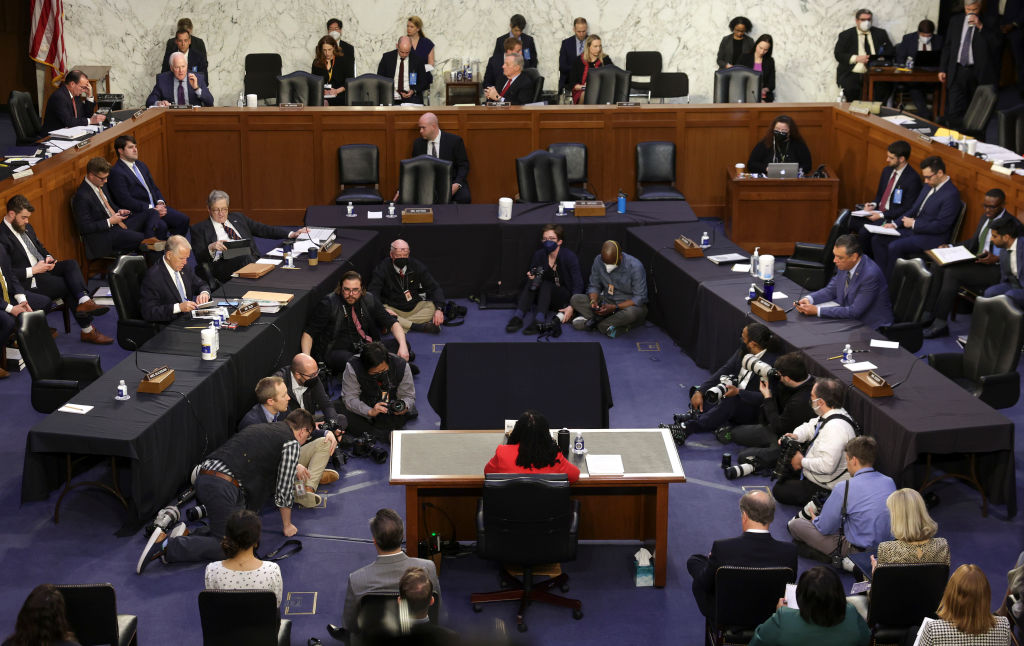Fundamental Fairness

The Constitution brings us as close to justice as we can hope to get this side of Heaven.
During the 2020 Democratic presidential primaries, then-candidate Joe Biden needed to secure victory in the South Carolina primary for his campaign to remain viable. To secure the endorsement of Representative James Clyburn, the dean of the South Carolina congressional delegation, he promised to nominate a black woman to the United States Supreme Court. President Biden made good on that pledge and nominated Judge Ketanji Brown Jackson to replace retiring Justice Stephen Breyer on the Supreme Court. Senate Judiciary Committee hearings on her nomination have concluded, and she appears to be heading toward confirmation.
Putting aside the irresponsibility of a mainstream presidential candidate endorsing a racial spoils system for political gain, this unforced error had one positive consequence: many more Americans are now paying closer attention to the High Court and the foundations of its constitutional role.
Recent polling reveals two points around Judge Brown Jackson’s nomination: a majority of Americans support nominating a black woman to the Supreme Court, but only 35 percent of Americans approve of President Biden’s approach of only considering a black woman to the exclusion of all other qualified candidates. The same poll indicates that a majority of Americans want a Supreme Court that follows the Constitution, but when they disapprove of the outcome the Constitution implies, they want “fairness” to be the deciding factor.
The Framers constructed the Constitution to preserve our God-given rights by constraining government. Indeed, they introduced the Constitution with a once more widely-known statement of purpose: “We the People of the United States, in Order to . . . establish Justice . . . and secure the Blessings of Liberty to ourselves and our Posterity, do ordain and establish this Constitution for the United States of America.” The blessings of liberty precede the formation of unified political authority because, as the Declaration of Independence announced, governments are instituted “to secure these rights.”
Our Founding Fathers understood that we needed a government strong enough to maintain order but sufficiently limited so that it didn’t suppress liberty. James Madison, the chief architect of the Constitution, recognized the need for competing constraints in Federalist No. 51: “If men were angels, no government would be necessary. If angels were to govern men, neither external nor internal controls on government would be necessary.” With the structural virtues of federalism and the separation of powers and the textual virtue of the first ten amendments of the Bill of Rights, the Framers reached a remarkable constitutional settlement.
The somewhat circular definition of “fairness” is “the state, condition, or quality of being fair,” that is, “free from bias or injustice.” Americans recognize the preservation of our inalienable liberties as the essence of justice in a constitutional republic. When faithfully applied, the Constitution produces the best political expression of “fairness” that we can hope to get. As Madison reminds us, we are not angels; our part on this earth is more toilsome.
It’s only when judges make forays beyond the limits countenanced by the Constitution, and second-guess the wisdom of the political choices of the American people, that we get unjust and undemocratic outcomes. Fifty years of Roe’s regime, for instance, only intensified what the late Justice Ruth Bader Ginsburg’s observed about that decision: a “heavy-handed judicial intervention [that] was difficult to justify and appears to have provoked, not resolved, conflict.”
There is nothing fair about judges substituting their judgment for that of the American people. There is nothing fair about rewriting the Constitution through a dubious interpretation to obtain an outcome that the democratic process denies. There is nothing fair about repeatedly following “demonstrably erroneous [precedent]—meaning decisions outside the realm of permissible interpretation—over the text of the Constitution,” as Justice Clarence Thomas put it.
President Biden’s willful misstep to exclude Asians, Hispanics, whites, men, and various other diverse and qualified judges from consideration for the Supreme Court should encourage our fellow citizens to engage in a serious conversation about the kinds of patronage and principle that undermine the Constitution’s role in securing our lives, our future, and our national destiny. If President Calvin Coolidge is still to be proven right that “to live under the American Constitution is the greatest political privilege that was ever accorded to the human race,” the outcomes it requires when honestly applied must remain worthy of our respect and allegiance.
The American Mind presents a range of perspectives. Views are writers’ own and do not necessarily represent those of The Claremont Institute.
The American Mind is a publication of the Claremont Institute, a non-profit 501(c)(3) organization, dedicated to restoring the principles of the American Founding to their rightful, preeminent authority in our national life. Interested in supporting our work? Gifts to the Claremont Institute are tax-deductible.
